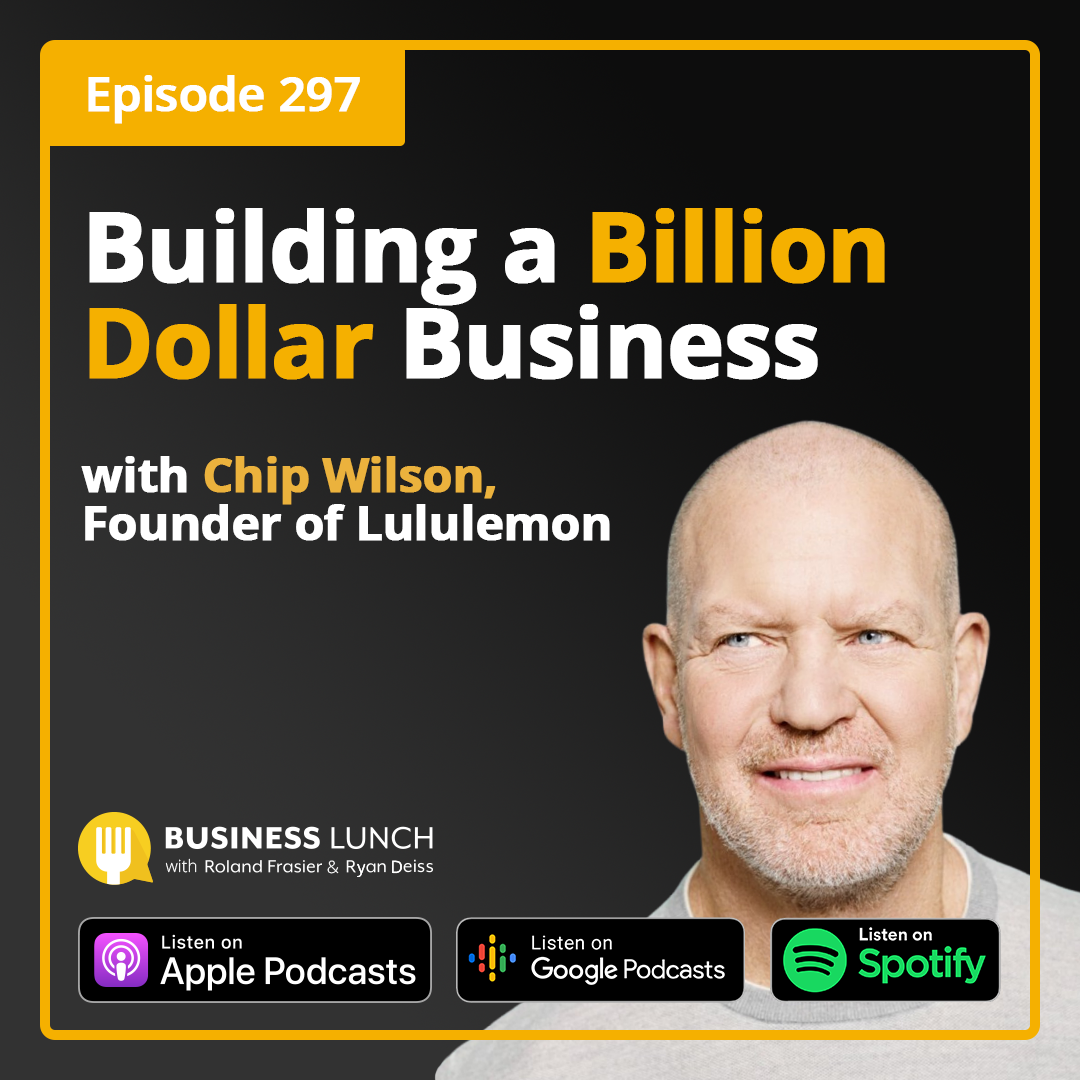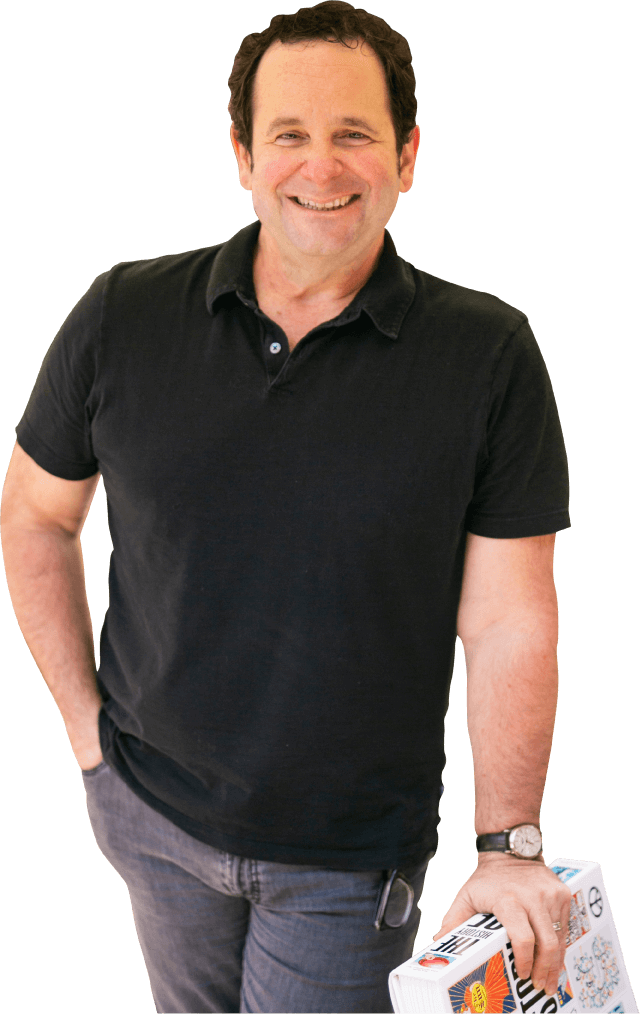Host Roland Frasier sat down with Chip at Traffic & Conversion Summit 2021 to pick his brain about anything and everything that has made him successful in life—above and beyond lululemon. From his philosophy on goal-setting to reading 100 books a year to inventing barbecue shorts and dog walker pants, Chip always has plenty of opinions, both popular and unpopular.
Listen in to their brilliant rapid-fire conversation.
Why does Chip have a thing for the number 43?
Chip says everyone gets glasses at 43. When people get glasses, they think, “Oh my god, I’m getting old.” Couples look at each other. Their kids are teenagers and don’t need their parents anymore. “Who are we together?” they ask. “Am I married to the right person? Do I live in the right city?” Chip thinks everyone should change their name at age 43. Unless they have a really cool name like Chip.
What is Chip’s philosophy on personal development and goals?
Chip says people tell you “a smart goal is achievable.” But he wonders if maybe we should fail at about 50% of our goals, as part of a training program to learn how to fail in life. When he first started setting goals, it was all about him. Life now is nearly perfect for him in every way. So, in order to stimulate himself, it has to be about other people winning. He moved from everything being about him to giving with no expectation of return. The Law of Attraction kicked in, and he started attracting people who were in it for something bigger than themselves.
What are Chip’s favorite business books?
When Chip was 19, he was working a construction job and had an opportunity to read the top 100 books. When he was 42, he listened to the top 100 business/health books as audio books and came to the conclusion that there are a handful of books that say it all. His top three are: Good to Great (Jim Collins); 7 Habits of Highly Effective People (Stephen Covey); and Psychology of Achievement (Brian Tracy).
What does Chip mean when he talks about linguistic adaptation?
Words are always changing meaning, and we have to adapt. As far as culture goes, the term “values” is out, Chip says. “Vision” is out, and “purpose” is in. Chip took 30 terms out of those books he read, and that’s what he runs his companies on. “Conditions and satisfaction.” When he’s discussing a project with somebody, there’s no end to the conversation unless they have conditions and satisfaction and a done-by date. “Integrity.” Integrity means I do what I say I will do when I say I will do it, and if I can’t get it done, I’ll go clean up my mess and reset new conditions and satisfaction. When everybody knows the terms and what they mean, then we’re all on the same page.
What did Chip do as a lead magnet that was a huge success?
A lead magnet used to be called a loss leader. Roland says, if you call it a lead magnet, you can charge a lot of money to sell information about it. Chip had a lead magnet with yoga mats to get people in his lululemon stores. Yoga mats were easy to make and while other people needed to make a profit, he didn’t. He owned his manufacturer. He just needed to get people in stores or online to get people to buy the clothing.
What was it like to sell lululemon?
When Chip was getting ready to go public with lululemon, the board of directors said he had to divest from the manufacturing, but the manufacturing was a critical part of the vertical retail model. Boards of Directors operate out of fear of the U.S. litigation system, Chip says. They become mediocre and fail to become great. At the time, Chip had three very young boys and two older boys. He had missed a lot of his older kids’ lives and didn’t want to do that again. So he traded in this amazing company to be a family man.
What avatars did Chip create that became so successful?
He created Ocean, a 32-year-old single professional woman, who owns a condo, is super stylish, travels, is athletic and super healthy. Ocean’s male counterpart is a 37-year-old man named Duke. You reach these people by perfecting the concept of vertical retail.
The ultimate vertical business is where you make something in a factory in Vietnam, someone in Norway orders a piece, and it gets shipped right from the factory to the person. If you own your factory, your shipping, your ecommerce, your marketing, you can take all those margins instead of contracting it out.
What’s the advantage of bootstrapping compared to having a lot of money?
Chip started a company six years ago called Kit and Ace, cashmere you can put in the washer and dryer. He says they had too much money and threw too much at it. He bootstrapped lululemon for a long time. When you’re bootstrapping, that’s where the very best creative ideas come from. When you have a lot of money, there’s no necessity to drive the invention.
What are some of those creative ideas that came from bootstrapping?
Back in the day, he couldn’t compete with Nike and Adidas with getting celebrity athletes, but he figured out that there’s a level of athlete right under that not getting anything. They’re the heroes in their community and have the most authenticity. Because he didn’t have the money Nike did, he spent one-millionth of the money and offered free clothes to yoga instructors. They were in front of 40-50 people every day and more authentic than a rich athlete. Other past creative ideas include BBQ shorts and dogwalker pants.
If you want to find out more about Chip, check out his website. He’s technically on social media, but someone else runs those accounts for him. “I don’t need an extra dollar,” he says. “I don’t need another friend. I’d rather be home spending time with my wife and kids.”
RESOURCES:
- chipwilson.com
- ethicallyprofit.com
- getepicchallenge.com
- Scalable.Co
- The Ready to Lead podcast
- DigitalMarketer Podcast
- Perpetual Traffic podcast
OUR PARTNERS:
- Get a free proposal from Conversion Fanatics
- Get 3% cash back on your ad spend with AdCard
- Get Roland’s book, Zero Down, FREE
Roland’s EPIC Challenge.
You may have heard about Roland’s EPIC challenge, which he moved online when the Pandemic hit. It focuses on Ethical Profits In Times of Crisis and dives into no-money out-of-pocket business acquisition strategies. If you’re interested in finding out more about this strategy, click here.
Contact & Follow Roland
Through his Website.
Contact and Follow Ryan Deiss
Through his Website.


